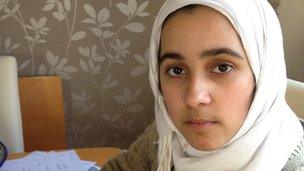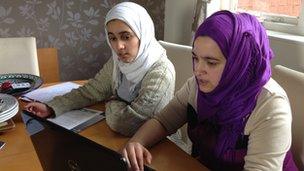Daily torment of racism in the classroom
- Published

Khadeja is one of a growing number of pupils to have faced racist abuse
School is finished for the day, but as on most evenings, 14-year-old Khadeja Fahat, is catching up on her school work.
Since the year 9 pupil faced racist Islamaphobic abuse every day at her school in Wilmslow, Cheshire, her education has suffered along with her mental health.
"I was tormented nearly every day; I was scared to go to school," said Khadeja.
"I used to go to school thinking: what am I going to face today?
"Is someone going to physically hurt me, or shout something at me or throw something at me?"
She continued: "The other children would shout verbal abuse at me; I was called a terrorist and a Taleban and asked why I was behind 9/11.
"Someone once shouted: look at that girl, she has a bomb in her bag.
"It made me feel so low and all my confidence had gone.
"I went from this happy girl who was always smiling and loved going to school and learning, to someone that didn't care about anything and just wanted each day to be over.
"I didn't understand why I was being treated like this. I was the same as the other students, except that I wore a headscarf."
'I stopped eating'
According to anti-racism charities, there has been a rise in Islamaphobia and racism in schools around the UK, and there are concerns that schools are not sure how to deal with it.
At first the year 9 student hid the abuse she was facing at school from her mother, Saiqa Shabir.
Mrs Shabir, a trainee teacher, of Pakistani origin, said that she was shocked when she found out about her daughter's bullying, and took it up with the school.
"Khadeja was very secretive about everything that was going on.
"When she eventually told me, I was upset, I was angry and disappointed in myself.

Khadeja is now trying to catch up with her school work
"I kept asking why I hadn't asked more questions about her day."
Khadeja says the bullying not only affected her education but also her health.
"I was so depressed and I lost weight because I just stopped eating, because I just didn't feel hungry.
"I just wanted to go to bed to get each day over with since there was nothing to look forward to, not even coming home, since I would have to go to school the next day."
Khadeja's mother says the last straw came when her daughter was punched by another student.
"I got a text from her saying someone had hit her in the ribs and she asked if I could collect her from school."
Mrs Shabir says that she was disappointed by the way the school dealt with the matter.
In an attempt to protect Khadeja from the abuse, which took place over six months from September 2010 to March 2011, her school assigned her a buddy who had to stay with her at all times.
But Mrs Shabir says: "The teachers were overwhelmed and did not know how to deal with the situation.
"She was being bullied by so many different kids from different years.
"It makes me so angry to think how the children behaved towards her, why were they able to take so much from her?"
Khadeja has now moved to a new school where she is slowly settling in and making friends.
But her education has taken a hit. Having missed three months of schooling, she is behind many of the other students in her year.
"We just want to bury the last year and move forward, everything that Khadeja went through was very hard on the whole family to deal with," said Mrs Shabir.
But pupils like Khadeja are not alone.
Anti-racism charities say that Islamaphobia is a significant problem in schools in some areas around the country.
Sarah Soyei, from the anti-racism charity, Show Racism the Red Card (SRRC) said: "We are seeing a growth in racist bullying towards Muslims students, and those from Roma, Gypsy and travelling communities.
"The fear of terrorism and the growth of right wing groups like the English Defence League has contributed to a growth of Islamaphobia in many classrooms around the country.
"Young people can pick up racist behaviour from parents or friends and from not understanding certain situations.
"But it is not about punishing very young children, it's about educating them so they can understand why these behaviours are wrong so they can change them," she added.
Prevention
The charity delivers anti-Islamphobia workshops in schools across the country, with the help of ex-professional footballers.
The aim of the lessons is to help young people challenge racist behaviour in the classroom.
It is hoped that educating young people against racism will prevent more students like Khadeja becoming victims.
Counselling has help Khadeja overcome the experience and she is trying to put it behind her.
"I had lost all of my confidence, and now it's slowly gradually building up.
"But I'm still nowhere near the bubbly and happy person I once was."
<italic>You can hear more on </italic> <link> <caption>Asian Network Reports</caption> <url href="http://www.bbc.co.uk/asiannetwork/news/" platform="highweb"/> </link> <italic> on the </italic> <link> <caption>BBC Asian Network</caption> <url href="http://www.bbc.co.uk/asiannetwork/" platform="highweb"/> </link>
- Published23 May 2012
- Published14 September 2011
- Published5 July 2011
- Published8 September 2010